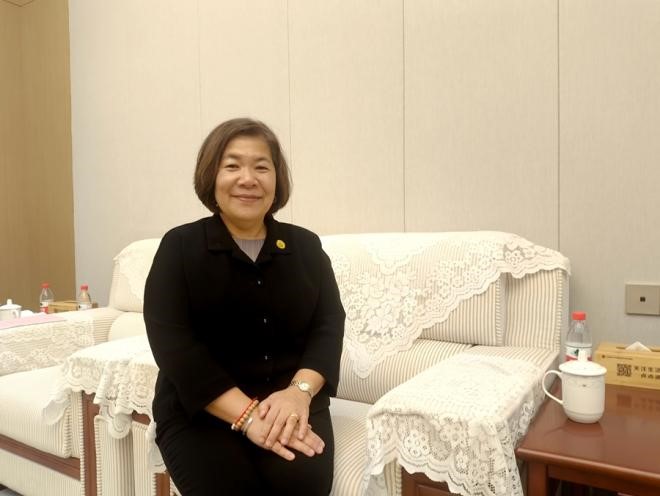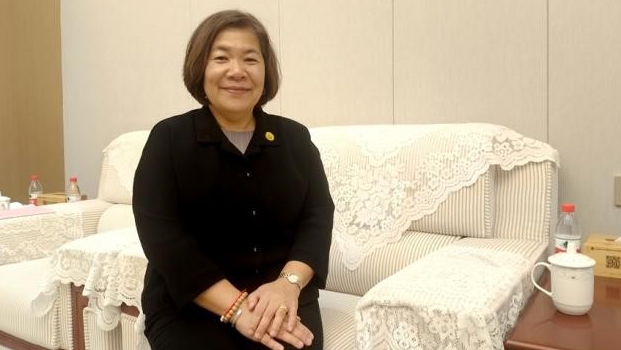
Busadee Santipitaks, CEO of the Mekong River Commission Secretariat, poses for a photo after the exclusive interview with China.org.cn, Wuhan, Hubei province, Sept. 23, 2025. [Photo by Xu Xiaoxuan/China.org.cn]
On the sidelines of the 4th Lancang-Mekong Water Resources Cooperation Forum set to open on Sept. 24 in Wuhan, Hubei province, Busadee Santipitaks , CEO of the Mekong River Commission (MRC) Secretariat, praised the deepening collaboration between China and Mekong countries, highlighting joint studies, real-time data sharing and coordinated disaster responses.
"The six countries along the Mekong have been working together based on dialogue and cooperation," Santipitaks said in an exclusive interview with China.org.cn. "China's contribution, especially as an upstream country, is very valuable to us."
The Mekong River - known as the Lancang River in China - flows through China, Myanmar, Laos, Thailand, Cambodia and Vietnam. The MRC was established in 1995 by four downstream nations to promote sustainable management of the basin, with China and Myanmar joining as dialogue partners the following year.
One of the most significant achievements, Santipitaks noted, has been in hydrological data sharing. China's Ministry of Water Resources has been providing flood-season data to the MRC Secretariat since 2002, which expanded to year-round information in 2020. "This has been shared on a continuous and consistent basis," she explained. "It is very valuable for downstream countries to prepare flood mitigation measures, especially during the wet season."
She recalled the unprecedented floods last year in Thailand, Laos and Myanmar, and those worsened by Typhoon Kajiki this year. Throughout these critical periods, China's coordination over dam releases upstream proved extremely important. "We reached out to China, particularly on the water release of the dam at the high point of the upstream of the lower Mekong Basin," she said. "This cooperation and information were very valuable to us because we could mitigate the flood impacts for the people."
Beyond crisis response, the MRC and the Lancang-Mekong Water Resources Cooperation Center have launched several joint research studies. One example Santipitaks mentioned was the first phase of the Joint Study on the Changing Patterns of Hydrological Conditions of the Lancang-Mekong River Basin and Adaptation Strategies which has now been completed, with the second phase currently underway.
She also underscored that sustainable water governance is closely tied to the UN's sustainable development goals. "Increasingly, we see impacts of climate change. This is something we have to tackle together, based on basin-wide management and existing mechanisms," she said.
As for the forum, Santipitaks called the event an important platform. "It's very valuable to us because we can learn from each other," she noted. "We can strengthen mechanisms in synergy, maximize technical expertise and knowledge sharing, and work more closely to prevent and mitigate floods."
She also emphasized China's broader role in the region. "China surely has the strength, the capacity, the technological leadership in water resources governance," she said. "Close coordination, consultation and cooperation using existing mechanisms are very important. The resources China brings - financial, technical and human - contribute greatly to the sustainability of the Mekong River."
As the MRC marks its 30th anniversary, Santipitaks reflected on the commission's evolving role. "It's about dialogue, cooperation and strengthening platforms with China," she said. "We use channels of communication with the Ministry of Water Resources of China, particularly through the Lancang-Mekong Water Resources Cooperation Center, to deliver the right directions and policies for basin management."
Looking to the future, Santipitaks pointed to key goals such as developing climate resilience, securing technical and financial resources, and building early-warning systems. "It's very constructive and positive," she said. "Strengthening cooperation with China ensures that we can apply modern technologies and know-how to better serve the needs of our countries - and safeguard the livelihoods of the people of the Mekong River Basin."


 Share:
Share: 




 京公网安备 11010802027341号
京公网安备 11010802027341号